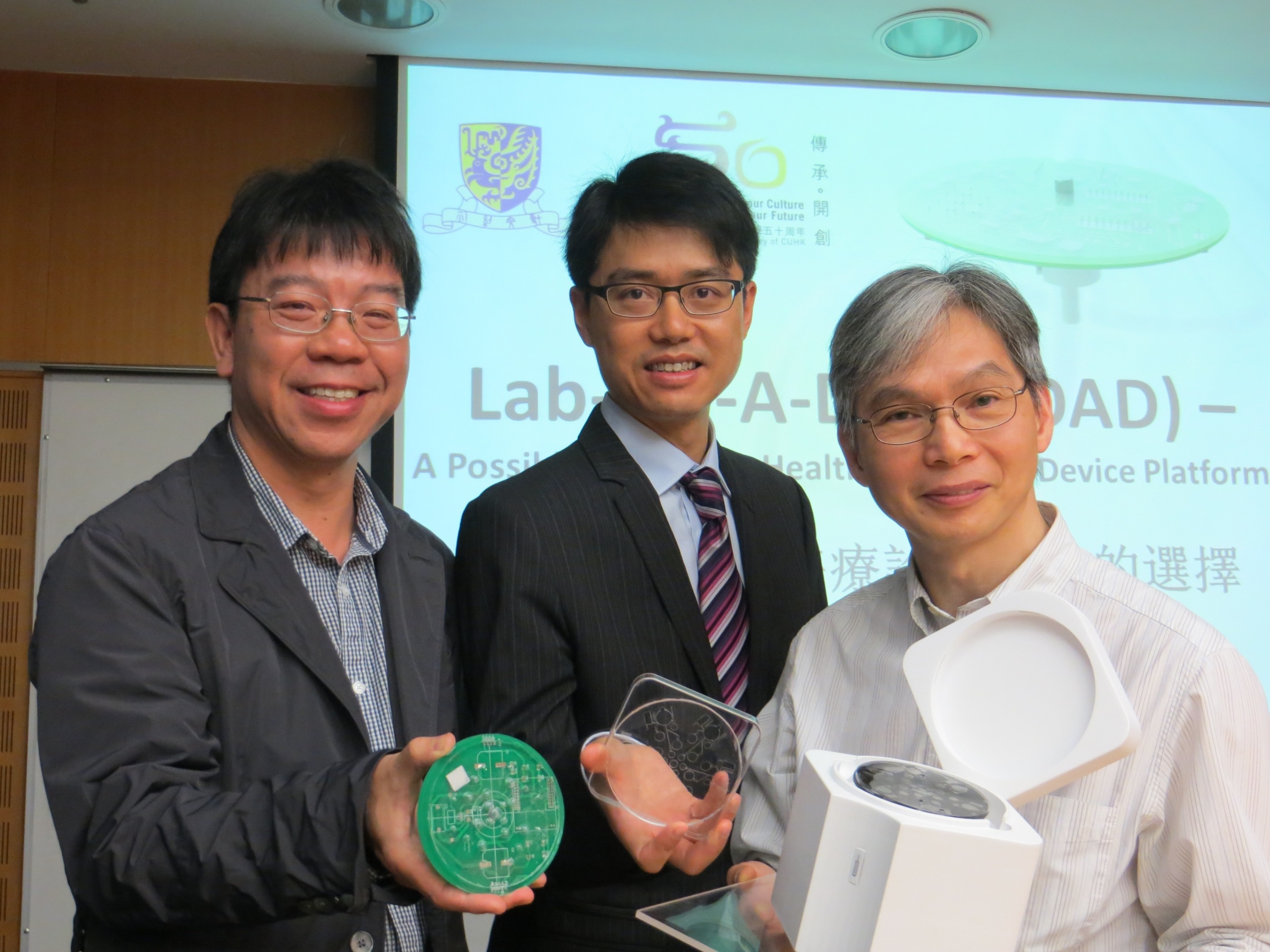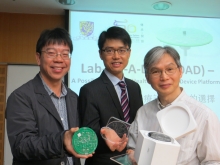CUHK
News Centre
CUHK Showcases Novel ‘Lab-on-a-disc’ Technology at Medical Devices FairSingle-step Bioassay Platform for DNA and Allergens
The Chinese University of Hong Kong (CUHK) will showcase five novel technologies at the forthcoming Hong Kong International Medical Devices and Supplies Fair (MDSF) 2014, to be held at the Hong Kong Convention and Exhibition Centre from 7 to 9 May. One of the featured projects is the ‘Lab-on-a-disc (LOAD) Platform – Bioassay Automation’ which is able to simplify complex DNA assay and allergen testing procedures to one single step, and results will be available within an hour on-site. This will greatly save the testing cost, time and manpower for sample handling, as well as reduce the chance of human error.
LOAD is developed jointly by three faculties of CUHK, led by Prof. HO Ho-pui Aaron, Department of Electronic Engineering, Faculty of Engineering; Prof. Patrick K.L. KWAN, Honorary Clinical Associate Professor, Department of Medicine & Therapeutics, Faculty of Medicine; and Prof. KONG Siu-kai, School of Life Sciences, Faculty of Science. The entire LOAD system is only of the size of an adult’s palm. The disposable assay cartridge is a round-shaped plastic disc that operates with a customized circuit board. Traditional DNA assay involves taking a blood sample from the clinic to a laboratory; adding reagents; reading assay signals with bulky equipment for genetic analysis and other biomarkers. This process often takes several days, and may lead to delayed treatment, prolonged hospital stay and extra clinic visits.
LOAD will take just a drop of the patient’s blood on the disc. Using high-speed centrifugal force, the blood will be directed to different chambers through the channels on the disc. The circuit board will control the temperature of each chamber for amplifying DNA, and the chemical reaction will be reported through fluorescent changes. After completion of the automated process, the final result will be sent to the clinician’s computer or portable device instantly and wirelessly. The entire test can be done inside the clinic with just a single step.
Recent research by CUHK’s Faculty of Medicine has revealed that patients with genetic variants may have allergic reactions to certain medications that are used to treat a range of common neuropsychiatric illnesses, including neuropathic pain, epilepsy, movement disorder, and bipolar affective disorder. These diseases affect over 10% of the total population. LOAD enables clinicians to identify patients with genetic variants which cause drug allergy before prescribing medications. LOAD also helps to detect disease-causing genes, such as cancers caused by mutated genes, so that patients can receive appropriate medical treatment promptly.
LOAD can be used for cell-based tests to identify allergens that may cause allergic reactions as well. At present, the general practice is to apply allergic substances on a patient’s skin directly, the allergens will be confirmed if allergic symptoms appear. This process may cause discomfort to the patient, and may even have harmful effects. The whole process of LOAD will be conducted outside the human body, and multiple samples can be assayed simultaneously, quickly and safely.
Researchers are studying the feasibility of assaying bacteria and viruses by LOAD, such as pulmonary tuberculosis bacteria, influenza A (H5N1), human immunodeficiency virus (HIV) and hepatitis B virus (HBV) and other infectious viruses. It is expected that the procedures can be greatly simplified in future.
To know more about the LOAD technology and other recent technological advancements, please visit the booth of CUHK at the MDSF (Booth No.: 3E-E22).



